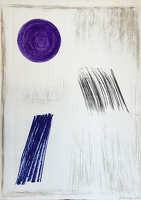
Jocelyn Barbara Hepworth
Autumn Shadow. 1969

Barbara Hepworth (1903-1975)
Sculptor, born in Wakefield, Yorkshire, who studied at Leeds College of Art, 1919-21 and the Royal College of Art, 1921-24. While at the RCA, Hepworth was not entirely satisfied with the teaching there and took part-time drawing classes at Leon Underwood's Brook Green School. In 1924 she travelled to Italy on a scholarship, studied the Italian technique of marble carving and married the sculptor, John Skeaping. She returned to London, and in 1928 moved to Parkhill Road Studios, Hampstead, where her neighbours were Cecil Stephenson, Henry Moore and Ben Nicholson. She had her first major exhibition in 1928 at the Beaux Arts Gallery, her work there consisting of stone carvings of figures and animals. About this time she showed at the Lucy Wertheim Gallery and in 1932 and 1933 she and Ben Nicholson visited the Paris studios of leading French artists. Her marriage to Skeaping ended in 1932. In 1933 she joined the Abstraction-Creation, an international Paris-based exhibiting society. Moving into an abstract phase and, like Henry Moore, she introduced the use of a hole into carved sculpture. With Nicholson and others, she was for a period, at the forefront at the modern movement in England. When World War II broke out, she moved with Nicholson and their triplet children to Carbis Bay, Cornwall and did not sculpt again until 1943. She also began employing strings to explore the tension or space within a sculpture. From 1951 she lived permanently at Trewyn Studios, St. Ives after the dissolution of her second marriage to Nicholson. Hepworth was a founder member of the Crypt Group with her husband Ben Nicholson but resigned in 1949 two years after its formation. She exhibited with the Penwith Society of Artists, St. Ives Arts Club and early in her career with the 7 & 5 Society and Unit One. Barbara Hepworth received many commissions from home and abroad and held retrospectives at the Venice Biennale, 1950, Whitechapel Art Gallery, 1952 and 1962, São Paulo Biennale, 1959 and at the Tate in 1968, the Yorkshire Sculpture Park, 1980 and at the Tate Gallery, Liverpool in 1994. Hepworth was created DBE in 1965 and after her tragic death in a fire, her studio was opened as a public museum. Arguably her most prestigious commission was 'Single Form' for the United Nations Building in New York which was unveiled in 1964.
 sold
sold  reserved
reserved  private collection
private collection